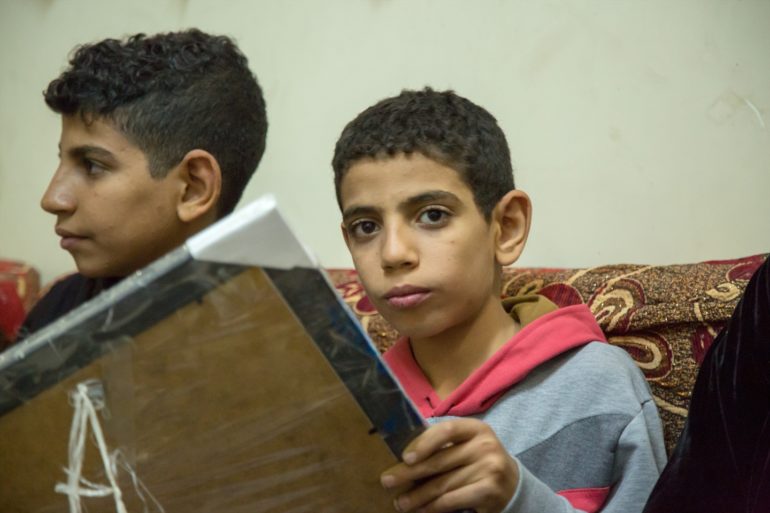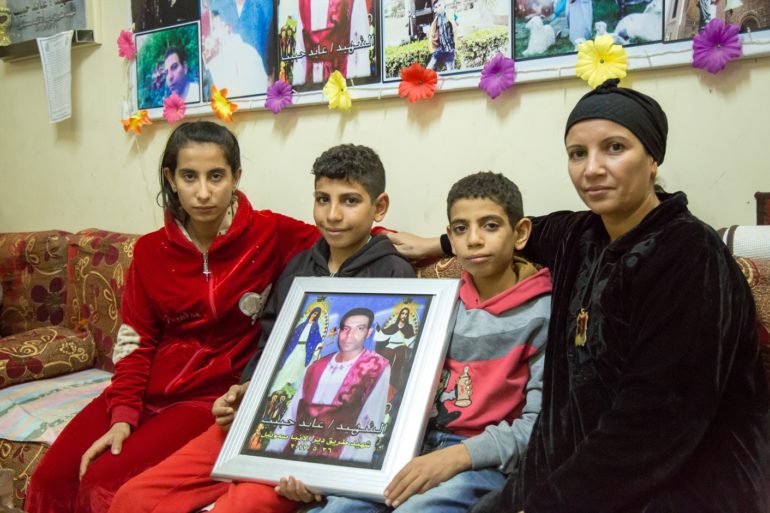
Marco and Mina live in a small village in the Minya region of rural southern Egypt. Both look young for their age, 14 and 10 respectively. On 25 May 2017, they joined their father Ayad to go to the monastery of St. Samuel. Ayad worked there and was going to teach the teenagers his job. He never got the chance.
Right before them on the road to the monastery, a bus full of pilgrims was attacked by a group of armed men. All the Coptic men who would not confess Islam were shot. Then the gunmen heard Ayad’s pick-up truck approach.
Mina recalls what happened that day, his empty eyes stare at the floor, his legs wobble impatiently. “My dad was driving, some of his colleagues rode with us. Then we heard shouting.”
While Mina stares in front of him, his mother, dressed in black, adds: “The boys told me they ducked behind the truck benches when they heard shouting. They were so afraid.”
Mina continues, his arms tightly wrapped round his body: “We heard them force our father to get out first. The man shouted he had to convert to Islam. My father said no. They shot him.”
One by one, the men were forced to step out of the truck. All chose Jesus over their own life. Then the men discovered the boys. Mina remembers that he was so, so afraid. One man shot at them but missed. “Another said: ‘No, let them live to tell the story.’”
The two were left with the dying. Marco, silently listening to his brother, continued: “We didn’t know what to do. We wanted to get help, but didn’t have mobile reception. I never drove before, but I told Mina to get back in the pick-up truck so we could find a place to call Mum.”
Marco, short as he is, could barely reach the pedals and didn’t show much above the steering wheel. But, amazingly, he drove the car to a place where they could phone. Then back to their father, who lay on the road, still bleeding.
Mina puts his little hands on his own chest: “This is where they hit them.” He taps his skinny legs, “And here as well.”
“My father was still breathing,” says Marco. “He couldn’t talk anymore, but he wagged his finger, signing us to go away. But we didn’t want to leave him.” They tried to lift him into the truck, but they were simply not strong enough.
“Then I put my father on my chest.” Marco says, his hand motioning to his body. “Soon my clothes were soaked with his blood, but I didn’t care.” Not much later Ayad died.
“And in his arms,” adds Marco.

Now the boys and their two sisters live without a father. Only in big pictures in the room is Ayad still with them. The brothers talk about what happened a lot. The images go through their minds daily. Asked if he still has nightmares, Mina answers with a quick yes.
“Mina is the one I worry about most,” his mother says, “he has become very fearful. He doesn’t dare to go out alone anymore. This wound he will carry for the rest of his life.”
But if family members stand up to pray, Marco and Mina join in. A quick glance at their father’s picture, before they close their eyes to be taken up in the loud prayers, reminds them that they must now cling to their Father in heaven.
